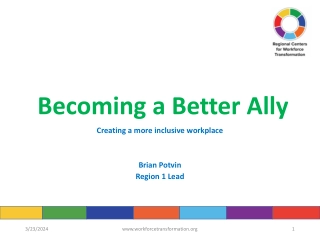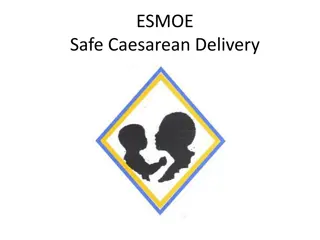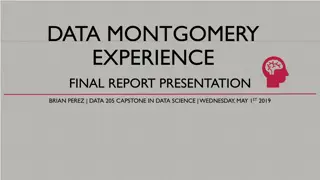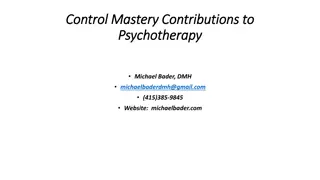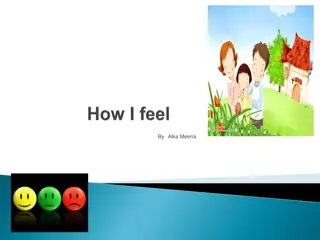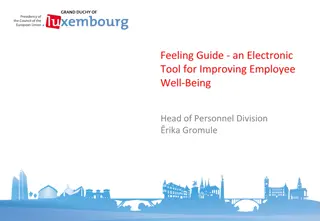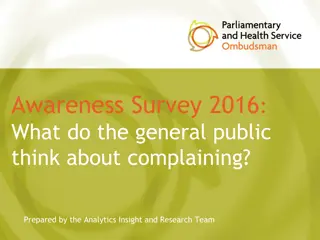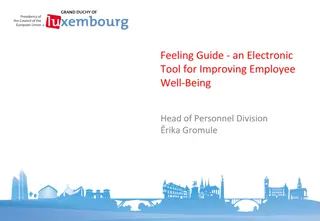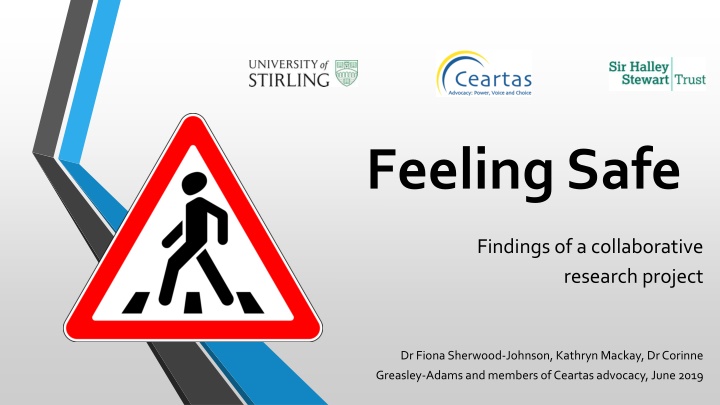
Insights on Older People's Safety and Vulnerability Research
Explore the findings of a collaborative research project focusing on safety and vulnerability among older individuals, shedding light on diverse perspectives and methods to enhance community safety. Delve into the significance of safety, resources for managing vulnerability, and factors impacting well-being.
Download Presentation

Please find below an Image/Link to download the presentation.
The content on the website is provided AS IS for your information and personal use only. It may not be sold, licensed, or shared on other websites without obtaining consent from the author. If you encounter any issues during the download, it is possible that the publisher has removed the file from their server.
You are allowed to download the files provided on this website for personal or commercial use, subject to the condition that they are used lawfully. All files are the property of their respective owners.
The content on the website is provided AS IS for your information and personal use only. It may not be sold, licensed, or shared on other websites without obtaining consent from the author.
E N D
Presentation Transcript
Feeling Safe Findings of a collaborative research project Dr Fiona Sherwood-Johnson, Kathryn Mackay, Dr Corinne Greasley-Adams and members of Ceartasadvocacy, June 2019
Older people, safety and protection: what we know and what we don t Much ASP research is linked to policy and legislation Service users tend to choose other types of research questions Lack of studies beginning with older people s: Perspectives Meanings Priorities Strengths
Research questions What do safety and vulnerability mean to older people living in the community who are supported by health and social care services? How important is safety in their lives? What resources/sources of support do older people draw on to manage vulnerability and secure safety? What other factors impact on their safety/vulnerability? How might improvements be made in the ways that older people in the community are able to keep and feel safe? What might be the best methods of capturing this knowledge?
Methods STAGE ONE: January 2017 June 2017 Two focus groups, with total ten participants Exploring safety & vulnerability using creative methods Designing methods for stage two STAGE TWO: July 2017 July 2018 Five participants each paired with a researcher Data collection over three month period Two-way discussions, three-way discussions, guided walks, images, review STAGE THREE: August 2018 July 2019 Thematic analysis, supported by two collaborative analysis workshops Beginning to share findings
1. Safety and vulnerability mean different things to different people But at this point in my life, I'm 65 this year, I do not feel vulnerable in any way, shape or form. And I think it's because of my mental attitude, if that's the right word to use. I think it's because my attitude in life, it's because I was dragged up instead of brought up. that's gave me, well, if somebody comes to the door, they're not wanting to do it with me, I'll just tell them straight, I don't care. Bob, Focus Group 2 depending on personalities and preferences
1. Safety and vulnerability mean different things to different people I mean, I do, at times, feel vulnerable. Like, this week, my son s away, and I know it's not right, but I feel a lost soul when he s away. Jane but you don't know your neighbours, I don't know who's through the wall from me. Jack depending on relationships and communities
1. Safety and vulnerability mean different things to different people Carol: Sometimes I bump into people and I don t want to. Researcher: Yes. So, that makes you feel bad. Carol: It makes me feel nervous. depending on environment
1. Safety and vulnerability mean different things to different people it s dark and also I feel so much more less able because I get very tired in the evening as well, I don t know what it is that makes you feel more unsafe; probably because you get out of doing it. You don t do it very often. I expect there s young people who are out and about in the dark so often and as you get older you probably don t... Jean depending on experiences over time
2. Keeping safe sits alongside older people s other priorities Researcher: how do you feel about living on your own, if I can ask that? Margaret: Actually, I quite enjoy it, but you're lonely at times. Dave: Aye. Margaret: And you feel vulnerable. Dave: Aye. Margaret: But I don't want to give it up, yet. Focus Group 1 for instance their sense of identity
2. Keeping safe sits alongside older people s other priorities I said, I couldn t do that to him, I couldn t go to my bed and sleep at night, knowing that I'd put him into a place that he hated. Jane there s fifteen stairs at the back of the house I can get down I don t go Jane doesnae like me going out. Harry for instance their relationships
3. People focused on their own skills and resources I know a lot of people come to me if they re going to have a scooter because they think I ve got a bit of, you know Jean But as time goes on, as I found out, you have to re-evaluate you say, well, I can't do that anymore, but I can still do this. Dave, Focus Group 2
4. Family, professionals, communities Researcher: Because I remember when we were in the shops and you were sitting down and the check out guy was trying to push through and the lady behind you, she turned round and said, take your time. You know, I thought that was really lovely. Jean: It is that yesterday I was in and then one, the one behind came and helped me with my bags. You know it is good when people do that, you know. were also drawn on as resources
4. Family, professionals, communities And one came, and she was a young girl. And I've no doubt she s got all her qualifications, but it was like talking to a book, you know. And I thought, no, I don't really want this, I don't want bogged down with this. So I phoned [name], and I said to her, I don't think this is gonna work. I said, I don't feel a connection with this girl .whereas I've only spoken to you on the phone, but I feel I'm on the same wavelength. Jane could require active negotiation and/or could be experienced as risks
Linking to formal ASP processes In/ability to safeguard takes place in a complex context: personalities and preferences; relationships; environments; experiences over time. Council officers can be perceived as a threat or an opportunity; much depends on Understanding the adult s hopes and sense of self, as well as the danger they are in; Protection plans work best when they are negotiated.
More information Project website, with links to visual and audio resources: https://feelingsafefeelingvulnerable.stir.ac.uk Contact: f.c.sherwood-johnson@stir.ac.uk k.j.mackay@stir.ac.uk


